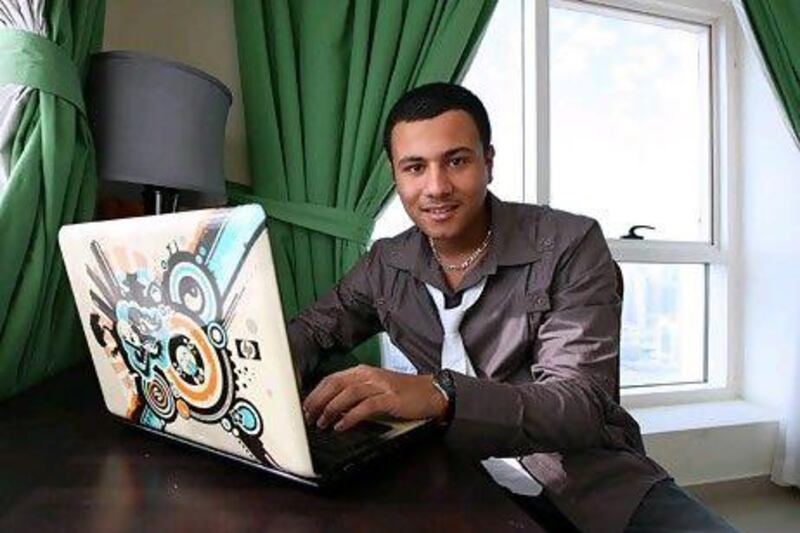Unlike most students his age, Ahmed Abou El Nasr, 16, is trying to stop a digital revolution, and a global competition might just be the springboard he needs.
Ahmed's secret weapons include encryption software that he designed to make it harder, if not impossible, to copy digital files such as songs, television shows and movies.
"I founded a company called Aema Creations," says Ahmed, who wants one day to sell his technology to companies that want to combat online piracy. "It's not registered, yet, but I put my logo on every product I create so people know all these products are created by me."
Well, Microsoft seems impressed.
The technology giant hosts an annual contest called Imagine Cup, where Ahmed made this year's top five from the UAE. Yesterday at the Jumeirah Beach Hotel in Dubai, he was trying to advance to the global finals in Sydney, where up to US$215,000 (Dh789,716) in cash awaited last year's overall winner.
While Ahmed did not advance, he walked away with the "People's Choice" award.
Yet, in many ways, neither Ahmed nor Microsoft is unique.
Numerous innovation and business competitions have sprung up in the Emirates in recent years, and their sponsors typically tempt budding entrepreneurs and aspiring tycoons by dangling money and the promise of fame. More important, though, organisers say, they also provide mentoring and networking opportunities to help innovative ideas come to fruition.
Of course, contestants first need to impress an intimidating panel of judges, some of the leading executives at companies here such as Al Gurg Group, Virgin Megastore and Barclays.
"Competitions are great vehicles to get people interested, challenged and involved," says Sana Bagersh, the founder of Tamakkan, which offers seminars for budding entrepreneurs and launched a new business plan contest this month.
Another local competition includes The Big Start, which will announce its third annual winner in June. This one was created by Al Tamimi Investments and finances the most commercially viable proposal out of all the applications the company receives.
While certain events, including Microsoft's Imagine Cup, start with a local contest, they eventually showcase budding entrepreneurs on a global stage.
On Thursday, at the world finals of the Hult Global Case Challenge in New York City, a group of students from around the world compete for $1 million. Competitors include students from New York University's campus in Abu Dhabi and the Dubai campus of Hult International Business School. The prize on offer will help finance the organisations the competitors are trying to help.
"I believe our model can work," says Songyishu Yang, a civil engineering student from New York University in Abu Dhabi with a focus on urbanisation.
"We have a trust-based model, which has been ignored [in the past]," Ms Yang adds. "We're proposing a solution addressing that issue, and if it turns out to work, it might change the market significantly."
Television has also become a major platform for the business stars of the future. Well, at least for those brave enough to compete week-after-week in the full glare of the cameras.
The UAE telecommunications company du, for one, plans to start filming and airing a new TV show this year dubbed The Entrepreneur. This reality programme aims to find the next "groundbreaking entrepreneurs" in the Emirates, according to Marwan Kaiss, the show's executive producer from Sony Pictures Television Arabia. "We want someone coming with a brand new idea that has not been done, ideally, in the whole world -and, realistically, in the UAE or Middle East region."
Away from the bright lights of television, there are less glamorous competitions. But that does not mean participants find them are any less gruelling. Kanika Amar, 22, joined the CIMA Global Business Challenge last year, where she and her team, Quad Core, competed against more than 100 groups in the Middle East.
Each team of undergraduates had to submit a 3,000-word report addressing concerns that were brought up in a case study of a mock business. Ms Amar and her team from Dubai advanced to Chengdu, China for the world finals, where they also had to give a PowerPoint presentation. Even though they failed to make the top six, her team received "huge exposure".
"We're put in front of top employers," she adds. "They are looking at your personality and talents, apart from your qualifications."
Hardly surprising, then, that the best of the best are quickly recruited by major companies.
CIMA, which stands for the Chartered Institute of Management Accountants, points out that some of its judges use the Global Business Challenge to find new recruits. "The winners got grabbed by well-known employers," says Geetu Ahuja, the regional manager for CIMA in the Middle East.
"We've been quite focused on developing the best in young business leaders of tomorrow, where we're looking at [them] to have skills on management and financial performance across the board."
Yet, being named the best in the world - or even securing a job - is not the end game for everyone.
Michael Mansour, a director of developer platforms and technologies at Microsoft, makes it clear that while the winner of the company's Imagine Cup gets to highlight their story internationally, "It's more than just about the winning team.
"We want our local teams to do fairly well. We provide them with access to free software for start-ups, [which] can get their business off the ground," he says.
Considering Ahmed is still at high school in Dubai, some might be quick to dismiss his business aspirations. But he is already wading into waters familiar to many aspiring start-up owners, where words such as "copyright" and "patent" get bandied about while visions of an entrepreneurial future take form.
"I'm planning to own [my software] but sell the usage rights," Ahmed says. "Companies as big as Adobe will need my project."
twitter: Follow and share our breaking business news. Follow us





